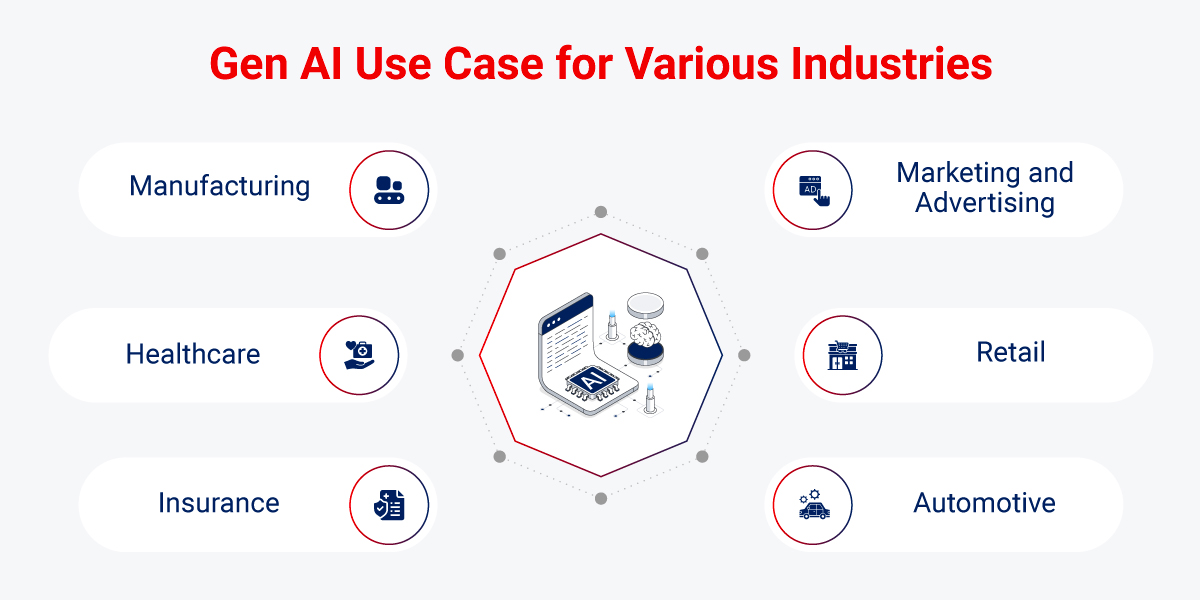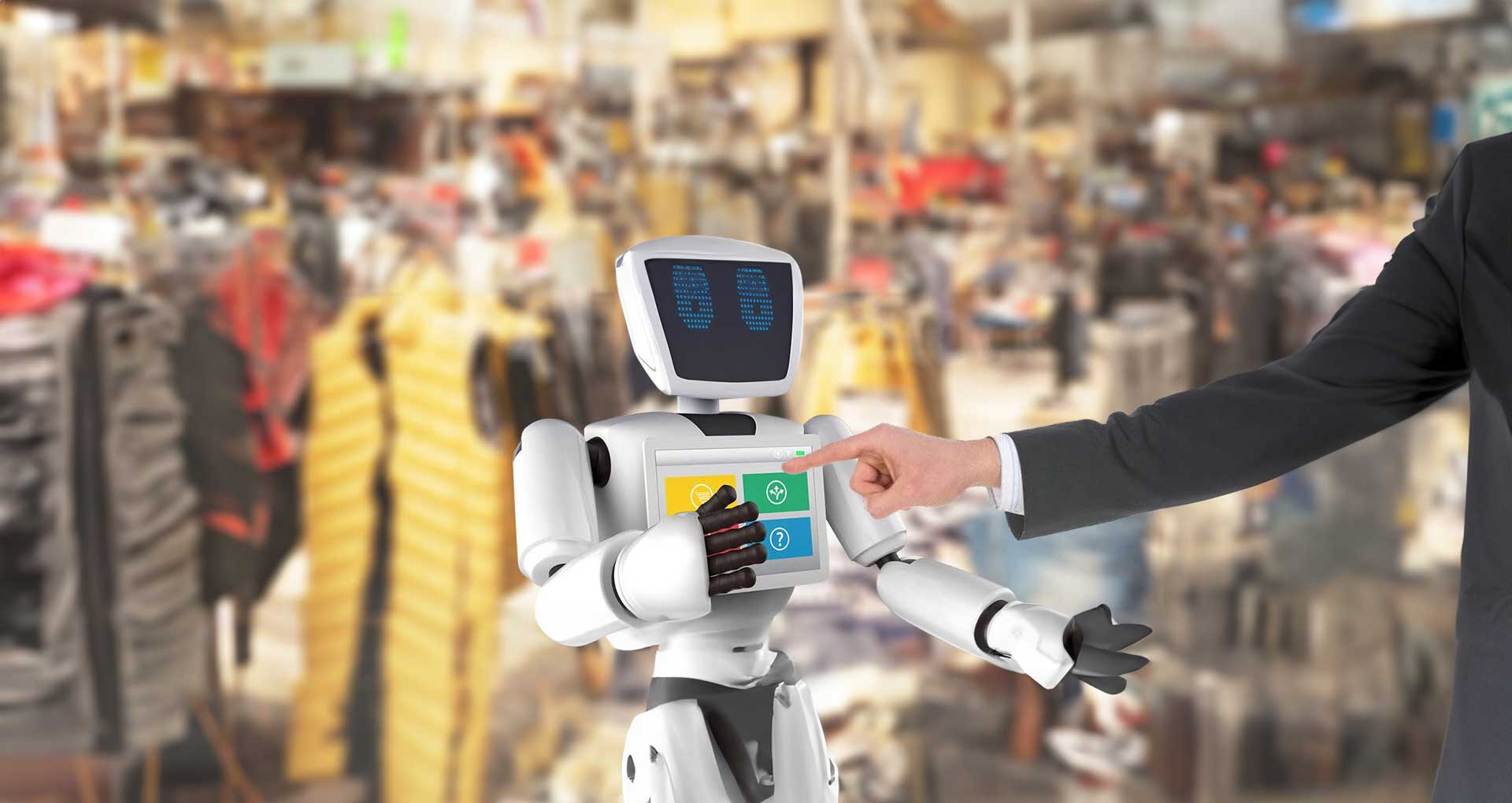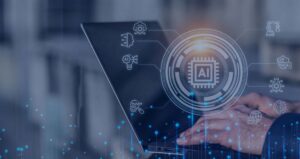Generative AI stands out in the dynamic landscape of artificial intelligence as a key player, serving as the foundation for streamlined operations and enhanced productivity. It is redefining innovation across multiple industries. Breakthroughs in the Gen AI field have enabled the creation of readable text and photorealistic, stylized graphics, and many more. Generative AI fundamentally combines various AI algorithms to represent and process content, powered by deep-learning models that drive iterative technological advancements. The introduction of diffusion models marks a turning point, enabling the production of increasingly realistic and sophisticated content.
In a rush to adapt and implement generative AI use cases across industries, in-depth research and careful consideration are required, which you will find in this blog. Let’s explore the various use cases.
Overview of Generative AI Use Cases Across Industries
Generative AI is transforming industries by creating new content, automating processes, and improving efficiency. In healthcare, it’s driving advancements in drug discovery and medical imaging. The finance sector benefits from enhanced fraud detection and personalized financial strategies. Marketing sees more targeted content and improved customer engagement while manufacturing leverages AI for optimized product design and quality control. With its growing potential across manufacturing, healthcare, insurance, retail, e-commerce, and automotive industries, Generative AI is set to revolutionize how we work and innovate.
Generative AI Industry Use Cases Shaping the Future of Businesses
Their versatility is already disrupting diverse industries and offers enormous potential across sectors. Let’s explore Generative AI use cases across different industries to provide you with valuable insights:

Generative AI Use Cases in Manufacturing
Generative AI in the manufacturing industry is transforming multiple aspects, providing a 360-degree shift. Mature generative AI models establish reliability and fully integrate with analytical AI to accelerate processes and simplify manufacturing operations.
- Inventory Management: GenAI enables real-time tracking, accurate demand forecasting, and secure data handling. By continuously adjusting inventory levels based on data insights, businesses can avoid the risks of stockouts or excess inventory. This intelligent infusion of AI helps streamline operations, ensuring optimal stock levels and efficient resource management.
- Quality Control: The adoption of Generative AI enhances manufacturing quality control by automating SOP creation, predictive analytics, and process optimization. From enabling proactive risk management to real-time data insights, efficient regulatory response, driving innovation, and reducing operational costs. Thus, by leveraging AI capabilities in the manufacturing process, manufacturers can ensure consistent product quality and streamline the end-to-end quality-checking process for greater efficiency.
- Faster Time-to-Market: Generative AI enables faster time-to-market by accelerating product development and launch timelines. From product management to market introduction, AI-driven solutions streamline each stage, identifying trends and eliminating obstacles that slow down the process. Key use cases include rapid prototyping, seamless design and development, efficient material selection, and hassle-free component supply, ensuring a smoother and faster manufacturing cycle.
Generative AI Use Cases in Healthcare
Navigating applications of generative AI in the healthcare sector is centered around modernizing health systems, processes, and infrastructure to unlock their full potential. As healthcare increasingly adopts AI-driven solutions, the global market for generative AI in healthcare is projected to grow from $1.07 billion in 2022 to $21.74 billion by 2032 at a compound annual growth rate (CAGR) of 35.14%[1]. This expansion highlights the transformative role of Gen AI in improving patient care and operational efficiency.
- Automated Administrative Tasks: Large Language Models (LLMs) like GPT-4 and PALM-2, along with generative AI, are revolutionizing healthcare administration by enhancing efficiency and accuracy across multiple functions. LLMs have the ability to generate more concise summaries right from vast patient data in Electronic Health Records (EHRs). This helps improve communication between healthcare providers and also reduces the chances of medical errors by flagging discrepancies in patient charts. Generative AI automates and optimizes various administrative processes. From smart appointment scheduling that takes into account patient preferences and provider availability to automated documentation and billing, AI transforms workflows and alleviates administrative pressures. By conducting real-time insurance eligibility verification, AI guarantees precise billing and significantly reduces delays, ultimately enhancing the overall efficiency of healthcare operations.
- Medical Research and Data Analysis: GenAI can propose new molecular structures that can significantly speed up the initial stages of drug discovery and lead to more innovative treatments. Its ability to accurately predict protein structures opens up new avenues for research and drug development, particularly for diseases involving protein misfolding or targeting specific protein interactions. Generative AI further offers innovative solutions that automate the extraction of structured data from unstructured electronic health records (EHRs), analyze documents, and use natural language processing (NLP) to interpret complex medical texts. It enhances the process of identifying patterns and aids in making strategic decisions for developing treatment approaches.
- Medical Education & Training: This technology promotes a safe environment for students to practice without real-world risks and can personalize learning experiences by adapting to individual needs. Moreover, generative AI simulates patient interactions, helping students improve communication skills and handle difficult conversations. It also tracks performance data, allowing educators to refine curricula and enhance teaching strategies based on student progress.
Generative AI Use Cases in Insurance
Insurance is a sector that is at a slow pace of embracing new technologies and tools. However, the booming era of Gen AI emphasizes the insurance sector to explore this latest technology in order to enhance efficiency and operational outcomes.
- Claim Management: Generative AI has a transformative impact on insurance claim processing and management by streamlining comprehensive operations and ensuring top-level accuracy. With the ability to generate and automate various tasks, insurance companies can extract data from claim submissions, ensuring all details are accurately filled in to move the process forward. Moreover, Gen AI, by leveraging NLP, can effortlessly interpret complex claim language and identify inconsistencies. Gen AI speeds up the claim management process, providing an automated claims experience that gets work done smarter and faster than before. It maintains accuracy while redefining claim management. Generative AI also helps improve productivity and efficiency in processing insurance claims.
- Fraud Detection: An integration among the machine learning models and Gen AI helps stand as formidable tools in detecting and efficiently responding to frauds by offering advanced capabilities like anomaly detection, synthetic data generation, and behavioral analytics. Generative AI also generates synthetic fraudulent claims to train fraud detection models and verifies document authenticity by analyzing inconsistencies.
- Contract Management: It enables automated contract generation based on templates, customizable clauses, and scenario modeling for risk assessment. Gen AI supports contract negotiation by generating counteroffers and analyzing risk. Also, it extracts and analyzes crucial contract data, helping insurers identify trends and manage risks more effectively. This leads to streamlined processes, reduced errors, and greater operational efficiency for insurance companies.
Read our insightful blog on Generative AI in the fintech industry and discover how it’s transforming financial services by enhancing customer experiences, improving risk management, and unlocking new growth opportunities.
Generative AI Use Cases in Marketing and Advertising
According to reports, the global generative AI in marketing market is expected to grow from $2.6 billion in 2023 to $41.1 billion by 2033, at a CAGR of 31.8% [2]. Let’s see how generative AI creates a strong foundation for the marketing and advertising industry to be more productive, creative, and efficient.
- Content Creative: Gen AI, like ChatGPT, is widely utilized in the industry to generate fresh content, brainstorm ideas, enhance personalization, and optimize ad performance. By analyzing existing campaigns, user responses, past interactions, and market trends, Gen AI helps improve ad copies, develop engaging content, and ensure timely delivery. This technology enables marketers to refine existing content and deliver personalized messages that resonate with target audiences.
- Image and Video Production: One of the more impactful Gen AI use cases in the ad and marketing sector is utilizing its real capability of producing content in the form of high-quality audio, video, and images. Tools like DALL-E 2 allow marketers to generate unique images, while platforms like Synthesia automate video production with AI-generated avatars. These examples perfectly showcase how Gen AI can boost efficiency, reduce costs, and create more engaging marketing content, paving the way for further innovation in the industry.
- Marketing Segmentation: Gen AI plays a key role in advanced customer segmentation by analyzing behavioral patterns and creating personalized marketing strategies. Using models like GANs or VAEs, AI can segment customers based on latent space representations, grouping them by similarities. This allows marketers to target micro-segments with tailored offers and dynamically adjust segments in real-time based on evolving behaviors. Also, look-alike modeling enables businesses to identify potential high-value customers similar to existing ones, leading to more effective targeting and personalized marketing campaigns across various channels.
Generative AI Use Cases in Retail and eCommerce
From creating content to personalizing customer experiences, generative AI is a comprehensive solution for the retail landscape. Here are some common generative AI use cases.
- Product Recommendation: Gen AI applications enhance product recommendations in retail and e-commerce by utilizing advanced techniques, as discussed previously, like analyzing customer behavior and product characteristics. By embracing models like Variational Autoencoders (VAEs) and Generative Adversarial Networks (GANs), generative AI can efficiently build latent space representations that are capable of capturing the underlying relationships between various customers and products. Also, this leading technology can generate new product representations and incorporate real-time data in order to ensure the offering recommendations are not just personalized but also contextually relevant to customers’ preferences.
- Smarter Product Research: Generative AI in retail and e-commerce can make the product research and development process quicker and more reliable with its thorough capability of automating the hypothesis design and testing processes. It combines data science and hyper-automation to analyze various factors from structured and unstructured data, including PDFs and documents. By leveraging advanced algorithms, generative AI can rapidly generate and test hypotheses about product displays and merchandising strategies. This enables retailers to adjust their online interfaces and smart displays in near real-time based on the results. When a trend emerges that drives sales of a specific item, generative AI allows retailers to quickly capitalize on it, optimizing the presentation of related merchandise and services to maximize revenue.
Generative AI Use Cases in Automotive
The impact of generative AI is evident across various industries and processes, and the automotive industry is also exploring more generative AI-based solutions. From enhancing the designing process to improving manufacturing efficiency and personalizing customer experiences, Gen AI is wholesome for the automotive sector. Here is a list of generative AI use cases in the automotive industry.
- Customer Engagement: The automotive industry is taking steps ahead to transform customer engagement through virtual assistants that understand natural language, respond to voice commands, and personalize driver experiences based on preferences. For connected vehicles, generative AI optimizes routing and navigation by analyzing real-time traffic and weather data, enhancing personalized in-car entertainment and driver assistance. Additionally, it improves battery management systems by estimating the State of Health (SoH) of batteries, predicting their remaining useful life for optimal performance.
- Gen AI Enhanced ADAS: To uplift the driving experience and convert it into a safer and more stress-free process, generative AI-enabled Advanced Driver Assistance Systems (ADAS) are sufficient. It enhances image analytics with object detection and recognition, allowing real-time identification of pedestrians, vehicles, and road signs for collision warnings. Semantic segmentation enables accurate interpretation of road scenes, while real-time camera data analysis facilitates precise object tracking.
- Content Synthesis for Vehicle Testing: Generative AI is pivotal in advancing the development of autonomous vehicles by generating synthetic data that addresses the challenges of gathering sufficient testing information in rare extreme situations. For Advanced Driver Assistance Systems (ADAS) and autonomous vehicles, generative AI can produce synthetic sensor data (such as LiDAR and camera images) to supplement real-world data, facilitating efficient training of perception systems. Additionally, it allows for the creation of virtual environments for comprehensive simulation and testing, enhancing vehicle safety through realistic crash and durability testing. By generating diverse scenarios, identifying anomalies, and providing contextual information, generative AI significantly optimizes the validation and testing processes for autonomous driving systems.
Partner with Rishabh Software to Build Your Own Gen AI-Based Model
Rishabh Software is a leader in transforming industries with exceptional Artificial Intelligence Development Services. With years of expertise, we specialize in building robust as well as trustworthy Gen AI models that serve as effective stand-ins for real data. Our seasoned data engineering team is committed to developing and integrating advanced AI-powered solutions and streamlining processes through innovative technologies like AI/ML and advanced data analytics to help your businesses harness the full potential of AI for enhanced efficiency and growth.
With our tech capabilities, we foster higher levels of human-machine collaboration through AI-powered conversational assistants and AI-driven automation, optimizing efficiency and reducing manual efforts. Our Generative AI development services are designed to help your business streamline a wide range of key industry processes to improve productivity and reduce operational costs. The skilled team of AI/ML developers and quality assurance team at Rishabh Software also offer constant support and monitoring, ensuring seamless integration and optimal utilization of AI technology in your business processes.
Frequently Asked Questions
Q: What key tools of Generative AI that are available to businesses?
A: Key tools include OpenAI’s GPT, Google’s BERT, DALL-E for image generation, and various platforms for text, image, and video synthesis tailored to specific business needs.
Q: Is Generative AI safe to implement across industries?
A: Proper risk assessment, ethical consideration, and data privacy measures are some factors to look after while utilizing and building generative AI solutions to make the world a much safer place.
Q: What are the limitations of Generative AI?
A: Limitations include potential biases in generated content, reliance on quality training data, and challenges in ensuring the authenticity and accuracy of the output.
Footnotes:
1. https://www.precedenceresearch.com/generative-ai-in-healthcare-market
2. https://market.us/report/generative-ai-in-marketing-market/











 30 Min
30 Min


